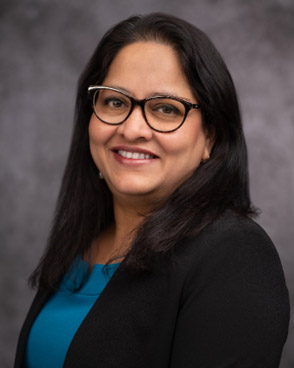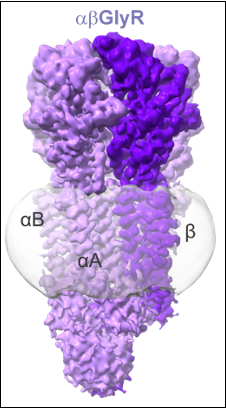2024 Stetten Lecture
Molecular Mechanisms Underlying Glycinergic Neurotransmission
Sudha Chakrapani, Ph.D.
John H. Hord Professor and Chair, Department of Pharmacology
Director, Cleveland Center for Membrane and Structural Biology
Case Western Reserve University
National Institutes of Health
Bethesda, Maryland
Videocast Link

Research Summary
 A 3D map of the heteromeric GlyR, GlyRa1b, determined using Cryo-EM. Credit: The Chakrapani Lab.
A 3D map of the heteromeric GlyR, GlyRa1b, determined using Cryo-EM. Credit: The Chakrapani Lab. Glycine Receptors (GlyRs) at the inhibitory synapses in the spinal cord and brainstem are key players in regulating motor and sensory signals. Differential expression of GlyR subunits governs their widely differing physiological functions, ranging from muscle tone and respiratory rhythm to pain perception. GlyR dysfunctions are associated with epilepsy, chronic pain, addiction, and autism. Targeted regulation of specific GlyR subtypes will require a detailed understanding of their structure, function, and pharmacology.
Over the last 25 years, Dr. Sudha Chakrapani’s research has focused on better understanding GlyRs, serotonin 3 receptors (5-HT3R), nicotinic acetylcholine receptor (nAChR), and other ion channels that mediate fast synaptic transmission at the neuronal and neuromuscular junction. She is especially interested in understanding the critical interaction between ion channels and bioactive lipids, including how this interaction is altered in the presence of different molecules like neurosteroids, cannabinoids, and anesthetics. Her lab’s scientific approach combines cutting-edge multidisciplinary tools that include cryo-electron microscopy (Cryo-EM) and X-ray crystallography for high-resolution structure determination, electron paramagnetic resonance (EPR) spectroscopy for protein dynamic measurements, and electrophysiology for functional characterization of ion channels. These techniques complement each other and provide an atomic description of how structure and dynamics govern protein functioning.
Dr. Chakrapani will present her work on glycine-induced conformational changes that underlie receptor cycling between closed, open, and desensitized states. These functional transitions are modulated by various endogenous and exogenous ligands, many with interesting therapeutic potentials. She will highlight findings from her lab on some of these regulatory pathways and the potential to harness this information toward subtype-specific drug development.
Biographical Sketch
Born and raised in India, Dr. Chakrapani came to the United States after completing her master’s degree in biomedical engineering. She received her Ph.D. in physiology and biophysics from the University at Buffalo and went on to complete postdoctoral positions at the University of Virginia and the University of Chicago. In 2010, she joined the faculty at Case Western Reserve University in Cleveland, Ohio, in the department of physiology and biophysics. She is now a professor and chair of the department of pharmacology and serves as the director of the Cleveland Center for Membrane and Structural Biology.
Dr. Chakrapani is supported by the NIGMS Maximizing Investigators’ Research Award program through grant R35GM134896.
